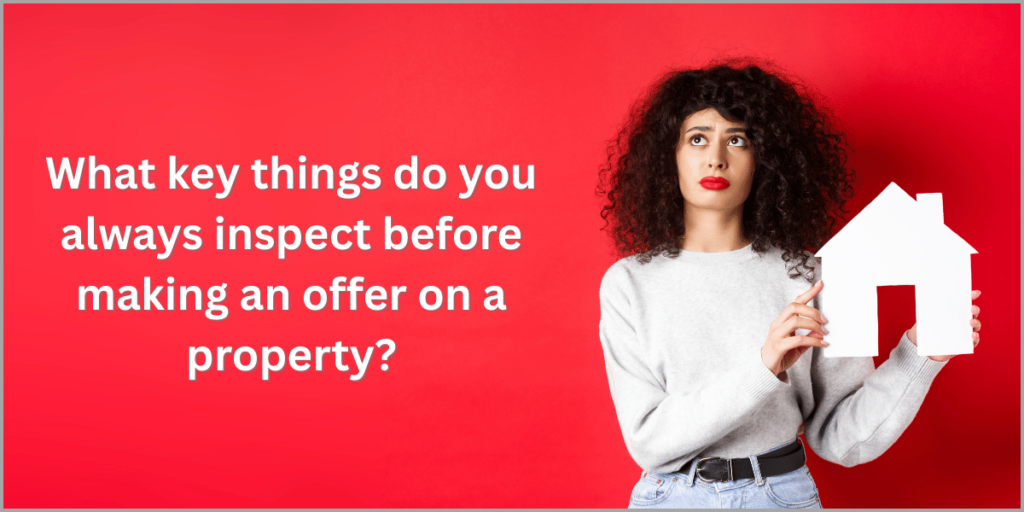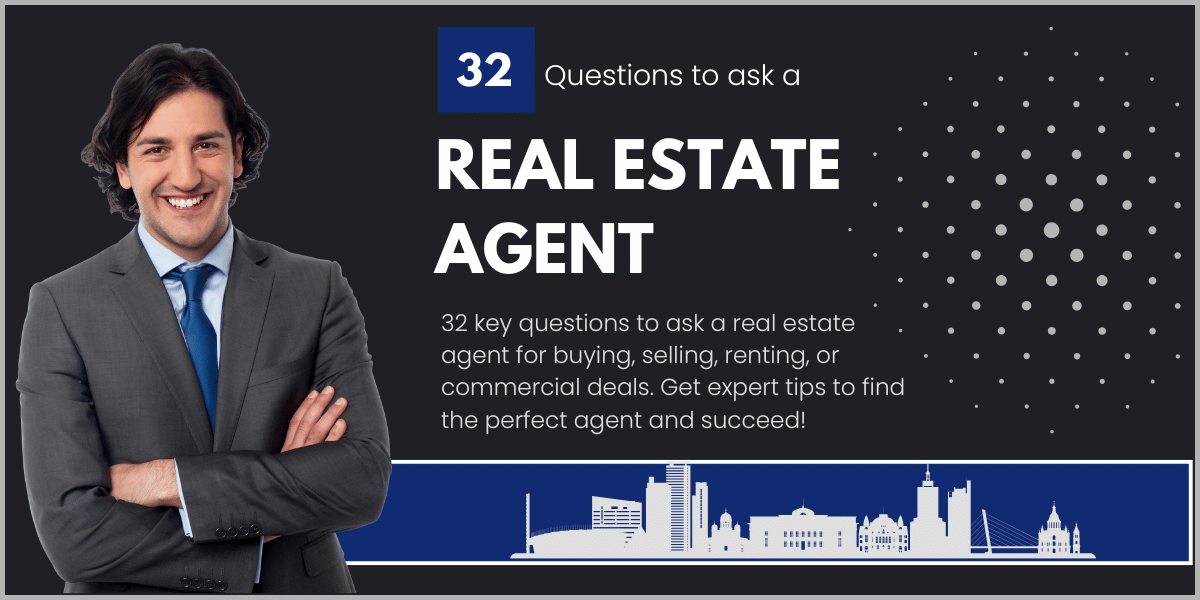32 Important Questions to Ask a Real Estate Agent
Buying a home, promoting a property, renting an apartment, or venturing into industrial real estate is not a small feat. It’s an interesting, sometimes nerve-wracking journey that includes huge economic and emotional stakes. The proper Real estate agent can make all the difference—performing as your guide, propose, and strategist. But here’s the seize: not each agent is the proper fit for you. That’s why understanding the best questions to ask a real estate agent is essential to finding a person who aligns with your desires and can provide results.
In this Blog, I’ve compiled 32 important questions to ask a real estate agent, carefully crafted to cover every perspective—whether or not you’re a first-time homebuyer, a seasoned seller, a renter, or exploring business properties. These aren’t just random questions; they’re designed to expose an agent’s understanding, conversation style, and commitment to your success. We’ll talk about why each question is important and what to look for in answers. To make the advice more real, we’ll also share stories from real life. This blog post has useful and interesting information that will help you feel confident in the real estate world. Allow us to begin!
Table of Contents
Why It’s Important to Ask Your Real Estate Agent the Right Questions

Imagine this: you’re about to make one of the most critical financial choices of your life—searching for a home, selling your home, or making an investment in a commercial property. The stakes are excessive, and the method is complex. A quality real property agent doesn’t simply display you listings or stick a “For Sale” sign in your yard; they’re your accomplice, supporting you keep away from pitfalls, negotiate well, and close the deal.
But select the wrong agent, and you may face overpaying, neglected possibilities, or countless stress.
I learned this the hard way when a friend of mine hired an agent without asking about their experience. The agent, new to the place, didn’t understand the local marketplace developments and priced her home too high. It sat unsold for months, costing him money and time. So, these questions to ask a real estate agent are very important. They will help you fully screen agents so that you find someone who is not only qualified but also a great fit for your specific needs.
There are 32 questions in this guide, divided into five groups: general qualifications, buying a home, selling a home, business real estate, and renting. Use them to talk to at least three agents, then compare what they say and go with your gut. A great agent will be happy to answer your questions and will not be angry when they do so. Are you ready to find your ideal real estate partner? Let’s get to the questions!
Questions You Should Ask a Possible Real Estate Agent (Questions 1–10)
These foundational questions to ask a potential real estate agent are your starting point. They assist you in verifying an agent’s experience, work style, and overall fit, whether you’re buying, promoting, or exploring different real estate ventures.
1. How long have you been a complete-real estate property agent, and what’s your expert background?
Experience isn’t the whole lot; however, it’s a strong indicator of an agent’s capacity to deal with the complexities of real estate. A full-time agent with 5 to 10 years of experience has probably dealt with tough talks, changes in the market, and problems that came up out of the blue. If they work part-time, find out how they handle their other obligations. Real estate requires quick decisions, especially in places where there is a lot of competition. Also, please find out about their past. Did they come from positions of bargaining in sales, marketing, or something else? These skills are useful in many situations. Look for a clear, sure answer that describes their journey.
2. What designations or certifications do you hold?

Beyond a well-known real estate license, designations like CRS (Certified Residential Specialist), ABR (Accredited Buyer’s Representative), or SRES (Seniors Real Estate Specialist) show a dedication to specialized training. These can show that the person is an expert in things like high-end houses, short sales, or housing for seniors.
It’s not a deal-breaker if they don’t have certifications—some dealers value hands-on experience more than anything else—but you should ask why. “I’ve focused on closing deals in this market, but I’m up-to-date on continuing education,” a great agent might say.
3. How many clients do you have right now, and how much work do you usually have?
Any agent with 20 or more clients might not be able to give you the care you need, and any agent with too few clients might not have enough work. Find someone who has 10 to 15 current clients. They’ll be busy; however, no longer possible to deal with them. To make sure you might not be left waiting at critical times, like when you want to send a suggestion, ask them how they prioritize tasks.
4. Can you provide references from your three most recent clients?
References show how well a person has performed in the past. Talk to past customers and find out how quick, useful, and satisfied they were overall. Would they lease the man or woman again? A confident agent will be happy to share information. When I called a reference, they told me that their agent got them a $10,000 seller credit after the check. That kind of story seals the deal.
5. How are you different from other real estate sales people in this market?
This question, with no right or wrong answer, lets agents show off their unique skills. They might use cutting-edge video tours or have strong ties with lenders in the area. Ask for info, like a time they used innovative advertising to sell a house for more than the asking price. Don’t accept vague answers like “I’m dedicated.” One answer that stands out is, “I use targeted social media advertisements to reach buyers from out of state. That’s how I got three offers on my remaining listing in a week.”
6. How do you prefer to communicate, and what’s your response time?
Holdups can value you your dream home in markets that move quickly. Make sure the agent’s style fits yours, whether you like to chat, call, or email. You should hear back within two to four hours during business hours, and you should have a clear plan for the evenings or weekends. One person I know uses a shared app to keep clients up to date in real time, and they love how open it is.
7. Will I work directly with you, or with a team?
Teams can work well, but you don’t want to feel like big steps are being given to a helper. Make it clear who is in charge of showings, negotiations, and papers. Meet the important people on the team to make sure you’re comfortable. A lead person should keep an eye on important choices.
8. Do you have a contract, and can I cancel without penalty if needed?
Most agents use contracts (5–12 months for sellers and 3–6 months for buyers). Ask with reference to your opinions—are you able to leave if the provider doesn’t meet your needs? An excellent agent gives fair terms, like a 30-day cancellation period without costs, to show that they agree with their clients.
9. How do you decide how much to charge for services, and what does that cover?
A normal commission is between 5 and 6 percent, split between the buyer’s agent and the seller’s agent. Get a thorough list of what’s included. For example, does it include professional photos, staging advice, or marketing? If the market lets you, negotiate, but put worth first. If an agent doesn’t sell your home well and charges low fees, it could cost you thousands of dollars in lost sales.
10. In the past year, how many deals did you close, and in what neighborhoods?

An agent who closes 15 to 20 deals a year in your target area knows the local neighborhood market well and knows what customers want, how prices change, and where the best offers are. Ask for specifics: “I closed 10 homes in [neighborhood], maximum of them $400k to $600k unmarried-family houses.” This shows that the information is applicable to your desires.
If you ask these questions of a real estate agent, you’ll be able to work well together. They help you figure out how professional, knowledgeable, and helpful they are in your area. Now, let’s talk about buyers in more detail.
What to Ask a Real Estate Agent Before You Buy a House (Questions 11–20)
Feelings and money can go up and down while you’re buying a home. These questions will help you ensure your real estate agent is prepared that help you discover the proper house at the right price.
11. How many buyers have you helped in the past year, and what’s your success rate?
Find an agent who works with 10 to 15 buyers a year and is best in your price range. If you want to buy a $350,000 apartment, an agent who only works with $2M estates might not put your needs first. “I helped five buyers in the $300,000 to $400,000. All of them were in [your area] last year,” she said.
12. What makes each neighborhood special to you?
An expert in the area knows about school districts, commute times, and new projects that are coming up. If you want to go after a suburb, make sure they’ve made deals there too, not just downtown. “I’ve sold 12 homes in [neighborhood]. It’s great for families because it has great schools and new parks,” could be a good answer.
13. How do you help buyers compete in a hot market?
It’s important to stand out in a seller’s market. Top agents suggest tactics like making offers before the inspection, having “escalation clauses,” or even writing seller’s letters personally. Thanks to the advice of their agent, one buyer I know won a bidding war by including a touching note about how they planned to raise their children in the house.
14. How long does it usually take from the first showing to the close for buyers?
A 45- to 60-day schedule is common in markets that are balanced. More than 90 days might mean that things aren’t working well, so ask why. Are buyers being picky, or is there a problem with financing? A good agent cuts down on delays that can be avoided.
15. How do you know if the price of a house is fair?
You can expect a full explanation of how they do a comparative market analysis (CMA) using recent sales of homes that are similar to yours. Condition, changes, and market trends are all things they should think about. A solid answer: “I study 3 similar sales that took place within the closing six months and evaluate your goal home to them, thinking of square footage and renovations.”
16. What red flags do you check for during property tours?

Professionals can identify problems that you might miss, like foundation cracks, antique HVAC systems, or HOA policies that make it tough to stay in a house. Their knowledge keeps expensive shocks from happening after the inspection. One agent saved me from a house that had hidden water damage by showing me faint stains on the roof.
17. Who do you recommend for mortgages, inspections, and other services?
Deals go more smoothly when the network is strong. They should give you several references of screened lenders, inspectors, and workers, and they should be honest about any financial ties they have. Ask, “How do you pick the providers you recommend?”
18. What happens if the appraisal is low or if the inspection show problems?
It may be necessary to renegotiate the deal or pay extra cash to cover a low appraisal. Problems found during the review could lead to repairs or credits. For example, “I once got the seller to pay $15,000 for roof repairs after the appraisal was low.”
19. How much earnest money should I offer, and what concessions might I expect?
1.3% to 3% of the price as earnest money shows that you are serious. You could ask the seller to pay the closing costs in a buyer’s market. In a seller’s market, being flexible makes your offer stronger. Find out what the norms are inside the location: “In this marketplace, 2% earnest money is standard, however I suppose 3% might give you an aspect.”
20. Can you take me step by step through the complete system of getting a house?
From pre-approval to closing, they need to move through every step and provide you with due dates for such things as inspections, appraisals, and the details of closing. This could be very important for first-timers. “We’ll start with a pre-approval, then tour 5–10 homes, try to make an offer within two weeks, and close in 45 days. I’ll be here to help you with inspections and paperwork,” is something a good real estate agent might say.
These questions to ask a real estate agent before you buy will help you find a partner who knows the market well and can help you get your dream home.
What to Ask a Real Estate Agent When You Want to Sell Your Home (Questions 21–28)
It takes planning, advertising, and negotiating to sell a house. These questions to ask a real estate agent when you’re selling your home will help you make the most money and feel the least stress.
21. How many homes did you sell, and how much did they cost?

A real estate agent who has sold 15 or more homes in your price range (for example, $400k to $600k) knows how to market it. Avoid managers who only work with high-end or low-cost homes if your home is in the middle range. “I sold 20 homes last year, 12 in your $500k range,” you might be told.
22. What’s your average days on market, and how does it compare locally?
A days-on-marketplace that is smaller than common (for instance, 30 days vs. A local average of 60 days) shows that the charge and advertising and marketing are running. Ask for facts: “My listings live on common for 25 days, at the same time as the neighborhood local average forty five days. This is because of targeted online campaigns.”
23. How do you decide how much to list the house for? What is your list-to-sale price ratio?
A good CMA looks at recent sales, the condition of the house, and market trends. A list-to-sale ratio close to 100% means that the price is right; a much lower ratio indicates that the price is too low to get quick sales. “My last 10 sales averaged 98% of list price, making sure sellers maximize value,” might be something a great agent says.
24. How are you going to sell my house?
You can assume a multichannel method, with open houses, MLS listings, professional pictures, digital tours, and social media. Smart agents may want to use video from drones or focused advertisements. A 3D tour that drew in buyers from out of town helped an agent make a sale. Ask for examples of similar things that have happened.
25. Will you work for both the client and me?

It is possible to have dual agency, but it can lead to problems. Your interests are put first when you have exclusive protection. Find out what their strategy is: “I avoid dual agency to make sure I’m completely loyal to you.”
26. How will you let me know about showings and offers?
Clear contact is very important. Do you want calls, weekly reports, or app notifications? “I send you daily feedback on showings and call you as soon as an offer comes in,” is something a good agent might say.
27. What will you do next if my house doesn’t sell quickly?
If an ad has been up for some time, it needs to be up to date, re-staged, or priced to decrease. Ask for a clean plan: “If it does not sell in 30 days, I’ll suggest expert staging and a 5% fee drop.”
28. What does your fee cover, and is it possible to make a deal?
With commissions of 5 to 6 percent, promoting, negotiating, and closing should all be covered. Make it clear what’s included and try to negotiate if the market is competitive. In order to get a top agent, a top agent might say, “My 6% includes professional photos and a staging consultation.”
When you’re ready to sell your home, these questions will help you set the right price, market it well, and get it sold quickly.
What You Should Ask a Commercial Real Estate Agent (Questions 29–31)
There is a lot at stake in industrial real estate. These questions will help you figure out how business-savvy the agent is.
29. What kind of experience do you have with buildings like mine, like retail, office, and industrial ones?
There are different areas for businesses and homes. An agent who has worked on more than 10 deals of your type of property knows about leasing, zoning, and how tenants behave. Ask, “Have you worked in an office like mine before?”
30. What are the market trends that are affecting the value of businesses right now?
Things like the rise of e-commerce and working from home have an effect on business properties. You can expect answers based on facts, like “Office vacancy rates are up 10% because of hybrid work, but retail is rebounding with a 5% cap rate.”
31. How do you figure out the return on investment (ROI)?
Look for people who can analyze things like cash flow forecasts, possible appreciation, and risk assessments. A professional might say, “I use pro forma models to estimate an 8% annual ROI based on rents and costs in the area.”
These questions will help you find a professional agent who can help you with your business.
How to Ask a Real Estate Agent About Renting (Question 32)
Are you renting? When you’re looking to rent, this question will help you get a great lease.
32. How do you see if an apartment is good, a good deal, and has suitable lease terms?
An excellent real estate agent looks into the landlord’s records, renovation information, and the terms of the lease, such as pet regulations and renewals. Ask, “How can I make certain I do not lease from a shady individual?” A precise answer might be, “I take a look at the records of protection and negotiate fair lease terms.”
How to Get the Most Out of These Questions
Get ready to find a great real estate agent with these 32 things to ask them. Here’s how to make good use of them:
- Take the time to plan. Please write down your most important questions and make sure they are relevant to your case (buying, selling, etc.).
- Interview a lot of agents and compare at least three of them to see how their skills and personalities are different.
- You should listen for specifics. Answers that aren’t clear are a red flag; ask for examples and facts.
- Trust Your Gut: If something about an agent doesn’t feel right, look elsewhere. For me, the proper one feels like a partner I can accept as true with.
Once the activity is executed, keep asking questions to make sure everyone is on the same page.
One agent stood out when I helped a friend interview them by giving a thorough CMA and telling a story about how they saved a deal after getting a low appraisal. We liked how honest that person was, and the deal went through without a hitch.
Extra Tips to Help You Pick the Best Agent

- Check online reviews. Sites like Zillow let customers give comments. Look for praise that is given regularly for results and contact.
- Ask for a CMA Right Away: Even before you hire them, ask for a practice CMA to see how well they know the market.
- Meet in Person: It’s best to talk online, but getting to know a person in person suggests how professional and friendly they are.
- Please make Sure They’re Available: Make certain their plan works with yours, particularly for showings on weekends.
Conclusion
These 32 questions will help you get the most out of your real estate agent, whether you are shopping for, selling, renting, or getting into commercial real estate. They help you in finding out what type of know-how an agent has, make sure you’re an amazing fit for them, and ensure the deal goes smoothly. Don’t rush; take some time to speak to people, evaluate, and believe your gut.
Are you prepared to locate your best agent? Start your real estate seek off right by asking those questions of the person. They will assist you in crossing from confused to excited. What are you going to ask first? Please inform me approximately within the comments. I look forward to hearing it!
Read more Blog here :
How to Write a Real Estate Agent Bio: Steps & Examples
How Do Commercial Real Estate Agents Get Paid?
13 Real Estate Agent Mindsets That Drive Success in Deals
